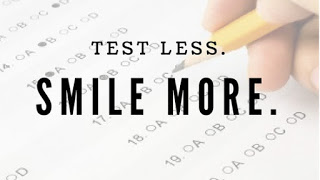This is a good read from Alyse Consiglio, who is the Principal at John F. Kennedy Catholic High School in Warren, Ohio (my alma mater!). Being a parochial school, JFK students aren’t subjected to the state test requirements that public schools are. But Mrs. Consiglio makes several good points that should be considered in the larger debate about state testing. She writes:
Test results aren’t useless. I personally looked at all JFK test results from 2016-17 and will continue to do so as our results return this year. I analyze our strengths and weaknesses as a school. I make copies and highlight relevant data, and every teacher receives a copy of their students’ results and my notes for the classes. Teachers break down scores by student to try and understand what is working and what needs work. The key part of this process is that we take this score as just one piece of the puzzle. Our students have so many talents. How they perform one day on one test does not define their worth as a student. I would emphatically say that no staff member at JFK treats any of our students as a score on a test. This is why we are data-informed and not “data-driven.” This data is just part of the evidence of student achievement. It is not the entire story.
She is spot on here. Our legislators and educational higher-ups have pushed these state tests as a way of measuring student achievement (and teacher effectiveness). But is it an accurate portrayal?
How can a teacher expect a student to achieve on a test when they come to school tired from staying up late with younger siblings because their parents are at work? Or they are hungry because instead of food, their parents spent money on drugs or alcohol? Or their medication isn’t working because their parents sold it? These are real situations that teachers face every day – I know, I’m married to one. Every student is different so by its very definition, asking them to take a standardized test is folly.
Every day teachers are educating students with various, sometimes ugly, backgrounds. They are imparting knowledge and wisdom, sharing compassion and love. How can a test measure this? And what about the students? Where is the joy of learning? I’ll tell you, it’s been killed by standardized testing.

From Psychology Today:
We know that for most children, kindergarten is anticipated with awe and enthusiasm – especially when one or older siblings are already in school… The idea of being a student is exciting. Most kindergarten or first grade students speak passionately about what they learn and do in school. Then, as years progress, burdensome memorization and test preparation are emphasized at the cost of diminished discovery, inquiry, and project-based learning. As school stops engaging children’s imaginations, boredom and frustration replace joy, and learning stops.
Our legislators and educational administrations would benefit from a very careful read of Mrs. Consiglio’s blog post – and note the title: “Test Less. Smile More.” Then they should reflect on it, and see how freeing students from the heavy burden of testing can make education relevant, effective, and (dare I say it?), fun!

